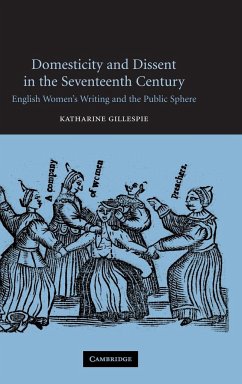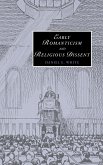Short description/annotation
Gillespie examines writings by seventeenth-century English Puritan women who fought for religious freedom.
Main description
In Domesticity and Dissent Katharine Gillespie examines writings by seventeenth-century English Puritan women who fought for religious freedom. Seeking the right to preach and prophesy, women such as Katherine Chidley, Anna Trapnel, Elizabeth Poole, and Anne Wentworth envisioned the modern political principles of toleration, the separation of church from state, privacy, and individualism. Gillespie argues that their sermons, prophesies, and petitions illustrate the fact that these liberal theories did not originate only with such well-known male thinkers as John Locke and Thomas Hobbes. Rather, they emerged also from a group of determined female religious dissenters who used the Bible to reassess traditional definitions of womanhood, public speech and religious and political authority. Gillespie takes the 'pamphlet literatures' of the seventeenth century as important subjects for analysis, and her study contributes to the growing scholarship on the revolutionary writings that emerged during the volatile years of the mid-seventeenth-century Civil War in England.
Table of contents:
Introduction: Sabrina versus the state; 1. 'Born of the Mother's seed': Liberalism, feminism, and religious separatism; 2. A hammer in her hand: Katherine Chidley and Anna Trapnel separate church from state; 3. Cure for a diseased head: divorce and contract in the prophesies of Elizabeth Poole; 4. The unquenchable smoking flax: Sarah Wight, Anne Wentworth, and the 'rise' of the sovereign individual; 5. Improving God's estate: preaching and the possessive economy in the writings of Mary Cary.
Gillespie examines writings by seventeenth-century English Puritan women who fought for religious freedom.
Main description
In Domesticity and Dissent Katharine Gillespie examines writings by seventeenth-century English Puritan women who fought for religious freedom. Seeking the right to preach and prophesy, women such as Katherine Chidley, Anna Trapnel, Elizabeth Poole, and Anne Wentworth envisioned the modern political principles of toleration, the separation of church from state, privacy, and individualism. Gillespie argues that their sermons, prophesies, and petitions illustrate the fact that these liberal theories did not originate only with such well-known male thinkers as John Locke and Thomas Hobbes. Rather, they emerged also from a group of determined female religious dissenters who used the Bible to reassess traditional definitions of womanhood, public speech and religious and political authority. Gillespie takes the 'pamphlet literatures' of the seventeenth century as important subjects for analysis, and her study contributes to the growing scholarship on the revolutionary writings that emerged during the volatile years of the mid-seventeenth-century Civil War in England.
Table of contents:
Introduction: Sabrina versus the state; 1. 'Born of the Mother's seed': Liberalism, feminism, and religious separatism; 2. A hammer in her hand: Katherine Chidley and Anna Trapnel separate church from state; 3. Cure for a diseased head: divorce and contract in the prophesies of Elizabeth Poole; 4. The unquenchable smoking flax: Sarah Wight, Anne Wentworth, and the 'rise' of the sovereign individual; 5. Improving God's estate: preaching and the possessive economy in the writings of Mary Cary.









